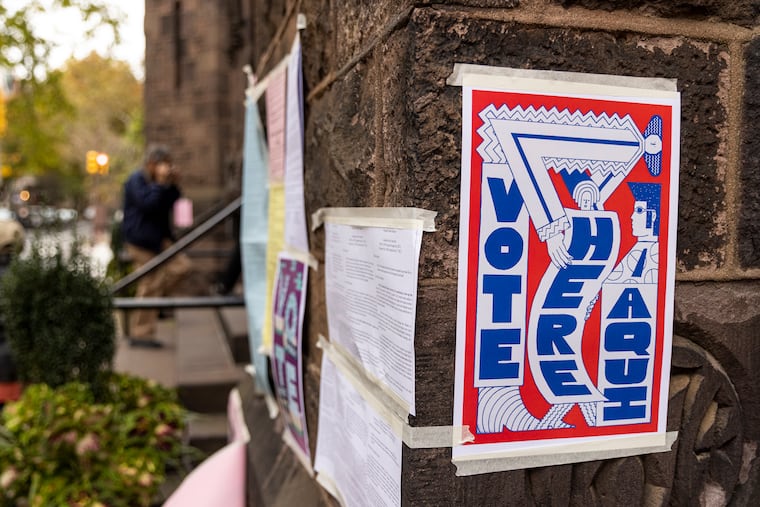Keeping faith during the last weeks of the presidential election
Chemist, author, and Roman Catholic theologian Michelle Francl-Donnay writes that it takes “a gritty grace” to embrace hope instead of fear.

“So is it madness to hope — or conceit, or cowardice, or grace?” That is the question Jesuit priest Alfred Delp asked as he sat in a Nazi prison cell in January of 1945 awaiting execution. How could he hope? It seemed illogical to entertain hope, he wrote, yet he could not stop returning to the question.
As the presidential campaign enters its final weeks, many of us are refereeing an internal wrestling match between hope and despair. How can we risk hoping when fear and chaos threaten to engulf us?
In the Bible, St. Paul famously said in a letter to the Corinthians that of the virtues faith, hope, and love, the greatest was love. What he didn’t say is that the hardest of these is hope. Love we can experience, faith we can cling to in the moment, but hope? Hope is always about what is just out of reach, always about a future we cannot predict with certainty, despite all the polls and statistical models.
It’s not just the election that has me grappling with questions about hope.
In July of this year, I sat in a doctor’s office in downtown Philly and listened to her say, “I know this is not the news you hoped to hear.” She went on to tell me I had an incurable and progressive neurodegenerative disease whose course is unpredictable. For now, treatment is working, but the future is uncertain. So believe me when I say I know something of the dance between despair and hope.
Five years ago, I wrote a book titled Waiting in Joyful Hope. Like Delp, whose story opens the book, my personal path toward hope — whether about the outcome of the election or my own health — takes its direction from a lifelong Roman Catholic faith and theological training.
Fear is the antithesis of hope. Fear seethes and rails.
As a parent, a wife, a teacher, and a scientist, I live ever in hope. I cannot help but look at my sons and my students without contemplating the hopes I have for them, and the hopes they have for themselves and the world, even when these hopes clash. I peer at the results of experiments, hoping they will reveal something of the hidden molecular world within my cup of tea. (And hoping, perhaps, not to set off another diplomatic incident.) Hope fuels my prayers, at Mass and in the Liturgy of the Hours.
Pope Benedict XVI wrote in his 2007 encyclical Spe Salvi (Saved in Hope) that “[t]he one who has hope lives differently.”
To live in hope is to thirst. To thirst for justice, for mercy, for healing, for welcome, for peace. To hope is to build up, not tear apart. St. Augustine wrote that the courage to challenge injustice was a daughter of hope. To live in hope, then, is to stretch my heart wide enough to encompass the needs of my neighbors as my own, to feed the hungry, house the homeless, and welcome the refugee. “We are workers,” said St. Oscar Romero. “We are prophets of a future not our own.”
Fear is the antithesis of hope. Fear seethes and rails. It preaches ruin and destruction, it deafens us to reality. Fear is a failure to see what is possible, a failure to see the worth and dignity of everyone I encounter. Yet fear clings like tar, I confess I cannot easily shake it off.
There is a reason, I suspect, that the phrase “Do not be afraid!” appears again and again in the Gospels. To live in hope is to turn down the volume on the rhetoric that demonizes others and tune in to the voices that call us to companion each other, as Jesus has promised to accompany us.
In 1965, Vatican II’s Pastoral Constitution on the Church in the Modern World reminded Roman Catholic believers that we have our feet simultaneously planted in two cities: our earthly dwelling and the divine one. I enter the voting booth with an eye on both worlds, bridged by my faith and by hope.
The Kingdom of God, then, is not for me a distant dream, but part of my present reality. And if joy is the surest sign of the presence of God, then to have a foot in that kingdom is to have access to joy.
So I cherish the small joys offered to me — chocolate, the cheerful conductor on the crowded SEPTA train — and strive to offer them in return. (Yes, I keep chocolate for my chemistry students in my office.) To live in hope is to be mindful of the joy that is here now, and for which I believe we are destined in eternity.
So is it madness or conceit or cowardice or grace to hope as we come to vote in this election?
Perhaps it is a touch of holy madness. Certainly, it takes a gritty grace. It may be conceit or even cowardice, but given the choice between hope and despair, I choose to live in joyful hope.
Michelle Francl-Donnay is a professor of chemistry at Bryn Mawr College, an adjunct scholar at the Vatican Observatory, and a parishioner at Our Mother of Good Counsel in Bryn Mawr. Her two most recent books are “Prayer: Biblical Wisdom for Seeking God” and “Steeped: The Chemistry of Tea,” which led to a small kerfuffle with Britain over the best way to make tea.